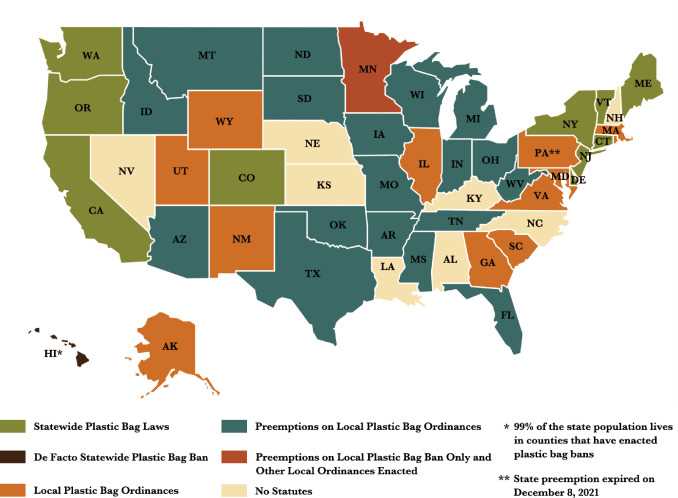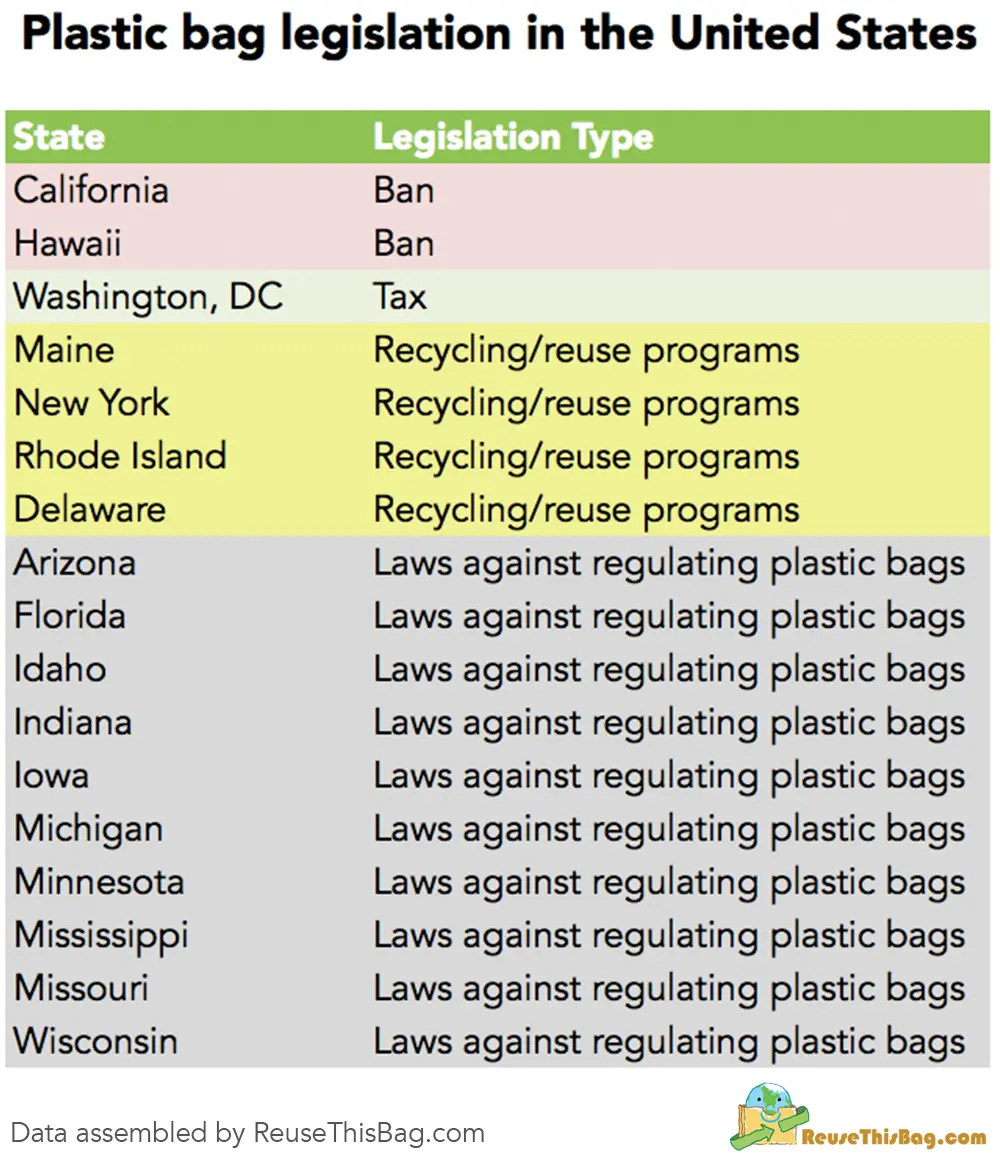Plastic bags have long been a staple of American shopping trips, but concerns about their impact on the environment have led to increased efforts to regulate their use. Many cities and states across the United States have implemented bans or restrictions on single-use plastic bags in recent years, aiming to reduce plastic waste and promote more sustainable alternatives.
In an effort to combat pollution and protect wildlife, several major cities such as San Francisco, Los Angeles, and Seattle have banned the use of plastic bags in retail stores. These cities have implemented measures that require businesses to offer reusable or compostable bags instead. The goal is to encourage consumers to adopt more eco-friendly options and reduce their reliance on disposable plastic.
The movement to ban plastic bags has also gained traction at the state level. California became the first state to enact a statewide ban on single-use plastic bags in 2014, and since then, several others have followed suit. States like New York, Hawaii, and Delaware have implemented similar measures to reduce plastic waste and protect their natural landscapes.
While the bans have been met with some resistance, many argue that the environmental benefits far outweigh any inconvenience caused by the restrictions. Plastic bags are notorious for their long lifespan and their ability to end up in landfills or as litter in oceans and waterways. By eliminating or reducing their use, communities hope to mitigate this environmental harm and encourage consumers to adopt more sustainable habits.
Although there is no federal ban on plastic bags in the United States, the movement towards regulation at the local and state levels shows promising progress. As more communities recognize the importance of reducing plastic waste, it is likely that additional regulations will be implemented in the future. As consumers, it is important for us to be aware of these regulations and to actively seek out alternatives to plastic bags in our daily lives.
- Plastics Regulations: An Overview of the Current Situation in the USA
- Examining the Implementation of Plastic Bag Bans in the USA
- Understanding the Environmental Impact of Plastic Bags
- Q&A:
- Are plastic bags banned in the USA?
- Which states have banned plastic bags?
- Are there any alternatives to plastic bags?
- What are the benefits of banning plastic bags?
- Are there any exemptions to the plastic bag ban?
Plastics Regulations: An Overview of the Current Situation in the USA

Plastic bags have become a major environmental concern due to their negative impact on wildlife, marine ecosystems, and the overall pollution they contribute to. In response to this issue, various regulations have been implemented in the United States to curb the use of plastic bags and promote more sustainable alternatives.
One of the most common regulations implemented at the state and local levels is the ban on single-use plastic bags. Currently, several states have enacted laws to restrict or ban the use of plastic bags, including California, New York, and Hawaii. These bans generally target lightweight plastic bags used in grocery stores, convenience stores, and other retail establishments.
In addition to the bans, many jurisdictions have also implemented fees or taxes on plastic bags to discourage their use. These fees, commonly known as “bag taxes,” are meant to incentivize consumers to bring their reusable bags or opt for alternatives such as paper bags or biodegradable options. The revenue generated from these bag taxes is often directed towards environmental initiatives or recycling programs.
| State | Plastic Bag Regulations |
|---|---|
| California | Single-use plastic bags banned in most retail stores |
| New York | Single-use plastic bags banned in most retail stores |
| Hawaii | Single-use plastic bags banned in most counties |
| Oregon | County-level regulations with some bans and fees |
However, it is important to note that not all states have implemented such regulations. Some states, like Texas and Florida, do not have statewide bans or fees on plastic bags. Instead, regulations may vary at the local level, with certain cities or counties enacting their own restrictions.
While the regulations on plastic bags differ across the country, there is a growing trend towards reducing plastic waste and promoting sustainable practices. As public awareness about the environmental impact of plastic bags continues to increase, it is likely that more states and local jurisdictions will adopt stricter regulations in the future.
Overall, the current situation in the USA regarding plastics regulations is a patchwork of state and local laws, with some states leading the way in implementing bans or fees on plastic bags, while others have yet to take significant action. As the detrimental effects of plastic bags become increasingly evident, the need for comprehensive national regulations may become more pressing in the future.
Examining the Implementation of Plastic Bag Bans in the USA
The implementation of plastic bag bans in the USA has seen significant progress in recent years. Many states and cities have introduced regulations to restrict or ban the use of single-use plastic bags in order to reduce plastic waste and promote sustainability.
One of the leading cities in implementing plastic bag bans is San Francisco, California. In 2007, San Francisco became the first major city in the USA to ban single-use plastic bags in large grocery stores and pharmacies. This ban was later expanded to include all retail establishments in the city. The success of San Francisco’s plastic bag ban has inspired other cities and states to follow suit.
In addition to San Francisco, other major cities such as Los Angeles, Seattle, and Chicago have also implemented plastic bag bans. These bans typically require retailers to provide reusable or paper bags instead of single-use plastic bags. Some cities have also imposed fees on paper bags in order to encourage consumers to bring their own reusable bags.
At the state level, California has been a leader in implementing plastic bag bans. In 2014, California passed a statewide law to ban single-use plastic bags in large retail stores. This ban was later expanded to include all retail stores in the state. Other states, such as Hawaii, New York, and Oregon, have also implemented plastic bag bans or fees at the state level.
These plastic bag bans have had a positive impact on reducing plastic pollution and promoting environmentally friendly practices. According to studies, the implementation of plastic bag bans can significantly reduce the usage of single-use plastic bags and encourage consumers to bring their own reusable bags. This, in turn, reduces the amount of plastic waste that ends up in landfills and oceans.
However, the implementation of plastic bag bans is not without challenges. Some critics argue that these bans can lead to unintended consequences, such as an increase in the use of paper bags, which may also have negative environmental impacts. There is also the issue of public acceptance and compliance with the bans, as changing consumer behavior can take time and effort.
Overall, the implementation of plastic bag bans in the USA has been a positive step towards reducing plastic waste and promoting sustainability. These bans have shown that it is possible to achieve significant progress in environmental protection by implementing regulations at the local and state levels. As more cities and states continue to adopt plastic bag bans, it is hoped that these efforts will contribute to a more sustainable future.
Understanding the Environmental Impact of Plastic Bags

Plastic bags have become a ubiquitous part of our daily lives, but their convenience comes at a significant environmental cost. Understanding the environmental impact of plastic bags is essential in order to address the issues they pose and develop sustainable alternatives.
1. Pollution: Plastic bags are a major source of pollution, both on land and in our oceans. Improperly disposed of bags can end up in waterways, harming marine life and polluting ecosystems. Plastic bags can take hundreds of years to break down, contributing to the problem of long-lasting pollution.
2. Resource Depletion: The production of plastic bags requires significant amounts of fossil fuels and energy. By using alternative materials and reducing the demand for plastic bags, we can mitigate the depletion of finite resources and reduce our carbon footprint.
3. Wildlife Impact: Plastic bags pose a significant threat to wildlife. Animals can mistake them for food, resulting in ingestion and potentially leading to blockages in their digestive systems. This can lead to injuries, malnutrition, and even death for animals in the wild.
4. Microplastic Pollution: Over time, plastic bags break down into smaller pieces known as microplastics. These microplastics can be ingested by marine life and can enter the food chain, potentially posing a risk to human health as well.
5. Landfill Space: Plastic bags take up a significant amount of space in landfills, as they are not easily biodegradable. This increases the need for landfill capacity and exacerbates the problem of limited space for waste disposal.
To mitigate the environmental impact of plastic bags, many countries and cities have implemented bans or restrictions on their use. This includes promoting the use of reusable bags, encouraging recycling programs, and incentivizing the use of environmentally friendly alternatives.
- Reusable bags made of materials such as cotton or canvas can significantly reduce the need for single-use plastic bags.
- Some countries have implemented charges or fees for the use of plastic bags, encouraging consumers to bring their own bags or use alternatives.
- Recycling programs are crucial in managing the disposal of plastic bags, as they can be made into new products instead of being sent to landfills.
- Exploring and investing in innovative alternatives, such as compostable or biodegradable bags, can also help reduce the environmental impact.
By understanding the environmental impact of plastic bags and taking proactive measures to address the issues they pose, we can work towards a more sustainable future where plastic bags no longer dominate our landscapes and harm our ecosystems.
Q&A:
Are plastic bags banned in the USA?
In the United States, there is no nationwide ban on plastic bags. However, several states and cities have implemented their own regulations regarding plastic bags.
Which states have banned plastic bags?
Several states in the USA have banned or regulated the use of plastic bags. Some of these states include California, Hawaii, New York, and Oregon. However, the specific regulations may vary from state to state.
Are there any alternatives to plastic bags?
Yes, there are several alternatives to plastic bags. Some common alternatives include reusable cloth bags, paper bags, and biodegradable bags made from materials like cornstarch. These alternatives are more environmentally friendly and can help reduce plastic waste.
What are the benefits of banning plastic bags?
Banning plastic bags can have several benefits. It can help reduce plastic pollution and litter, protect wildlife, and reduce the consumption of non-renewable resources. Additionally, it can encourage the use of more sustainable alternatives and promote a shift towards a greener economy.
Are there any exemptions to the plastic bag ban?
Some states and cities have exemptions to their plastic bag bans. These exemptions may apply to certain types of businesses or situations where there is a need for plastic bags, such as for sanitary or medical purposes. It is important to check the specific regulations in each jurisdiction to understand the exemptions.